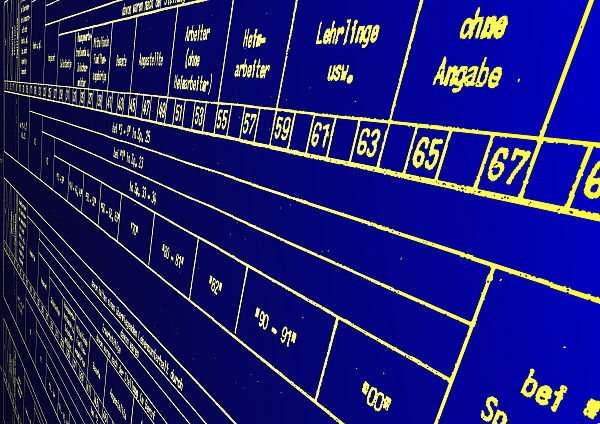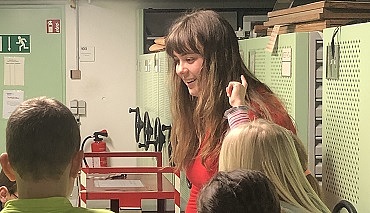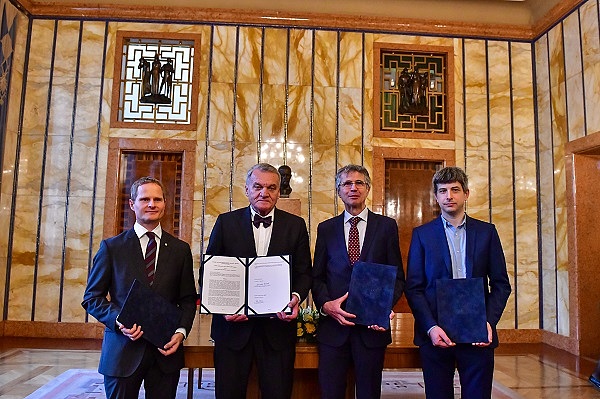Call for Participation: Databases for 2080 – Preserving database content for the long term
Mission Statement

The workshop will happen on October 5/6 2021. See the agenda on our workshop page.
Workshop mode: virtual
Participants: 55 invited persons (IT professionals, archivists, librarians, engineers from academia and business) – apply for participation at dbs.for2080@la-bw.de.
Timetable: confirmation for presenters in March, confirmation for participants in June
In April 2020, Kai Naumann of Landesarchiv BW published a challenge about how to preserve 125 databases for an imaginary customer in such a way that they can be used in as many ways as possible in 2080. In the following 60 years a) no costs should be incurred apart from the secure storage of the data and b) the database contents must not be publicly accessible (for data protection reasons). By database our client understands the graphical user interface, the business logic and the contents of the database management system (DBMS).
The archived form of the databases should contain records or protocols about the archiving process. The variety of usage scenarios ranges from queries by nonspecialists to further usage in the DBMS of the year 2080. We have the opportunity to convince the client to limit the preservation of certain components of the databases in the interest of cost efficiency. We can use existing tools, processes and standards for our task.
Kai presented the findings of the challenge at WeMissiPRES 2020 (Video at https://youtu.be/F3GjxD-iUpo?t=2450 and also at the Web Archiving and Digital Libraries Workshop during the JCDL 2020 (Paper on https://vtechworks.lib.vt.edu/handle/10919/99569).
It turned out that there aren't any technical solutions for this scenario, let alone business models. But there are some standardisation efforts and lots of good ideas on how to proceed. That’s why we want to hold this workshop and answer some questions together:
- Do we need persistence for whole databases or can we mostly rely on derived datasets?
- Are there multiple, technically different business cases like emulation vs. migration or only one basic business case that varies only in terms of IT ecosystems and DBMS types?
- Do we sufficiently document our appraisal decisions when transferring database records into an archive?
- Do we have a complete software tool suite for the task? Where do we need more software support? How can this be achieved?
- Is standardisation in the area scarce, sufficient, or exaggerated? Do we need a single standard or can we rely on overarching standards like CSV and XML?
- Is our documentation for reviving an archived database a self-explaining bootstrap routine?
- Do we need additions to intellectual property legislation regarding database archiving?
- Is the emerging NOSQL technology even more difficult to preserve?
Call for Participation
We invite practitioners to take part in this workshop. Feel free to ask questions to dbs.for2080@la-bw.de!
Workshop Conditions
Conditions for all
The workshop presenters, participants, and the host share these values:
- Maintain neutrality in respect to solutions, approaches, sectors and vendors.
- Be open to all stakeholders.
- Maintain sound stewardship of our shared resources.
- Be authoritative, current and concise in all our publications and communications.
- Be respectful, welcoming, inclusive and transparent in all our dealings.
Presenters, participants, and the host’s staff give their consent to being recorded by video in the working phases of the workshop and to the videos being made available on the internet.
Conditions for presenters
Presenters will have to supply presentation slides in PDF format within five workdays after the workshop. Additional materials (text, demo sites, videos) are welcome.
Presenters will have to review the draft conference proceedings of the workshop concerning their presentation within ten workdays after they are made available to them.
Presentation slides
-
Introduction by Kai Naumann (Landesarchiv Baden-Württemberg)
03Introduction.pdf (pdf/1.33 MB) -
Brigitte Mathiak (GESIS): Sustainability strategies for digital humanities systems
Mathiak_GESIS.pdf (pdf/1.59 MB) -
Raja Appuswamy (EURECOM): Storing and reviving databases on DNA
Appuswamy_EURECOM.pdf (pdf/676.23 kB) -
Klaus Rechert (University Freiburg i.Br.): Emulation options for legacy databases
Rechert_UFreiburg.pdf (pdf/1.69 MB) -
Damir Bulic (Spectral Core Ltd): Database preservation through conversion technology
Bulic_SpectralCore.pdf (pdf/4.62 MB) -
Luis Faria (KEEP Solutions, LDA): Preservation through standardisation with DBPTK
Faria_keep.pdf (pdf/4.07 MB) -
Kuldar Aas (National Archives Estonia): E-ARK standardisation efforts for databases
Aas_NAEstonia.pdf (pdf/1.62 MB) -
James Doig (National Archives Australia): Transfer and Preservation of Databases at the National Archives of Australia: Problems and Directions
Doig_NAAustralia.pdf (pdf/2.19 MB) -
(Manuscript) James Doig (National Archives Australia): Transfer and Preservation of Databases at the National Archives of Australia: Problems and Directions
Doig_NAAustralia_manuscript.pdf (pdf/514.64 kB) -
Markus Schmalzl (Directorate General of State Archives Bavaria): A tool for the preservation of data from governmental and research databases
Schmalzl_GdA Bayern.pdf (pdf/819.9 kB) -
Torbjørn Aasen (Intercommunal Archive Møre og Romsdal): Database ingest and use at public archives with the SIARD format
Aasen_IKAMR.pdf (pdf/11.42 MB) -
Martin Rechtorik (National Archives Czech Republic): DB archiving and use at Czech authorities
Rechtorik_NACzech.pdf (pdf/3.19 MB) -
Boris Domajnko (National Archives Slovenia): Accessing SIARD databases
Domajnko_NASlovenia.pdf (pdf/426.56 kB) -
Kai Naumann (Landesarchiv Baden-Württemberg): Wrapup
04Wrapup.pdf (pdf/1.17 MB)



